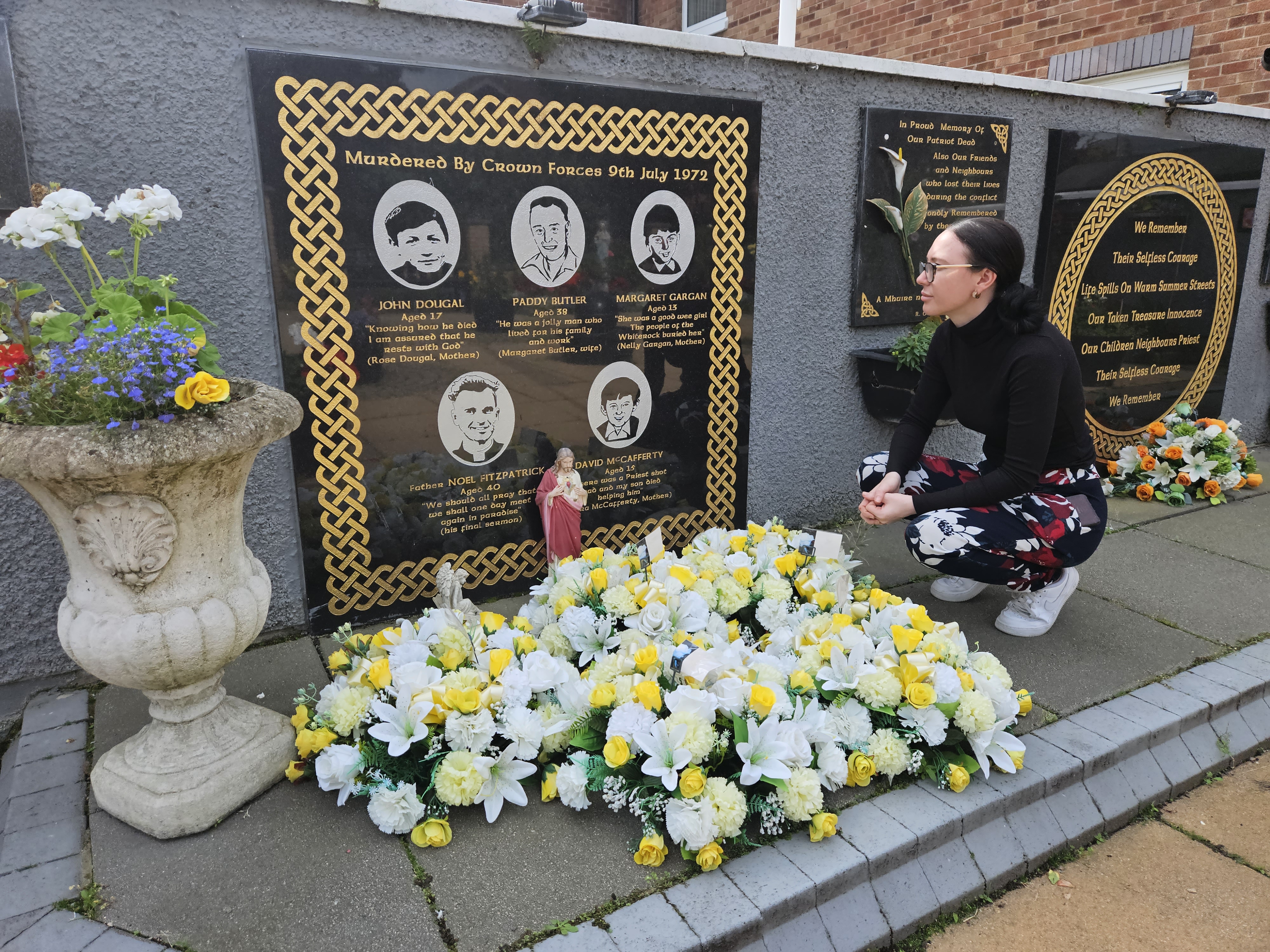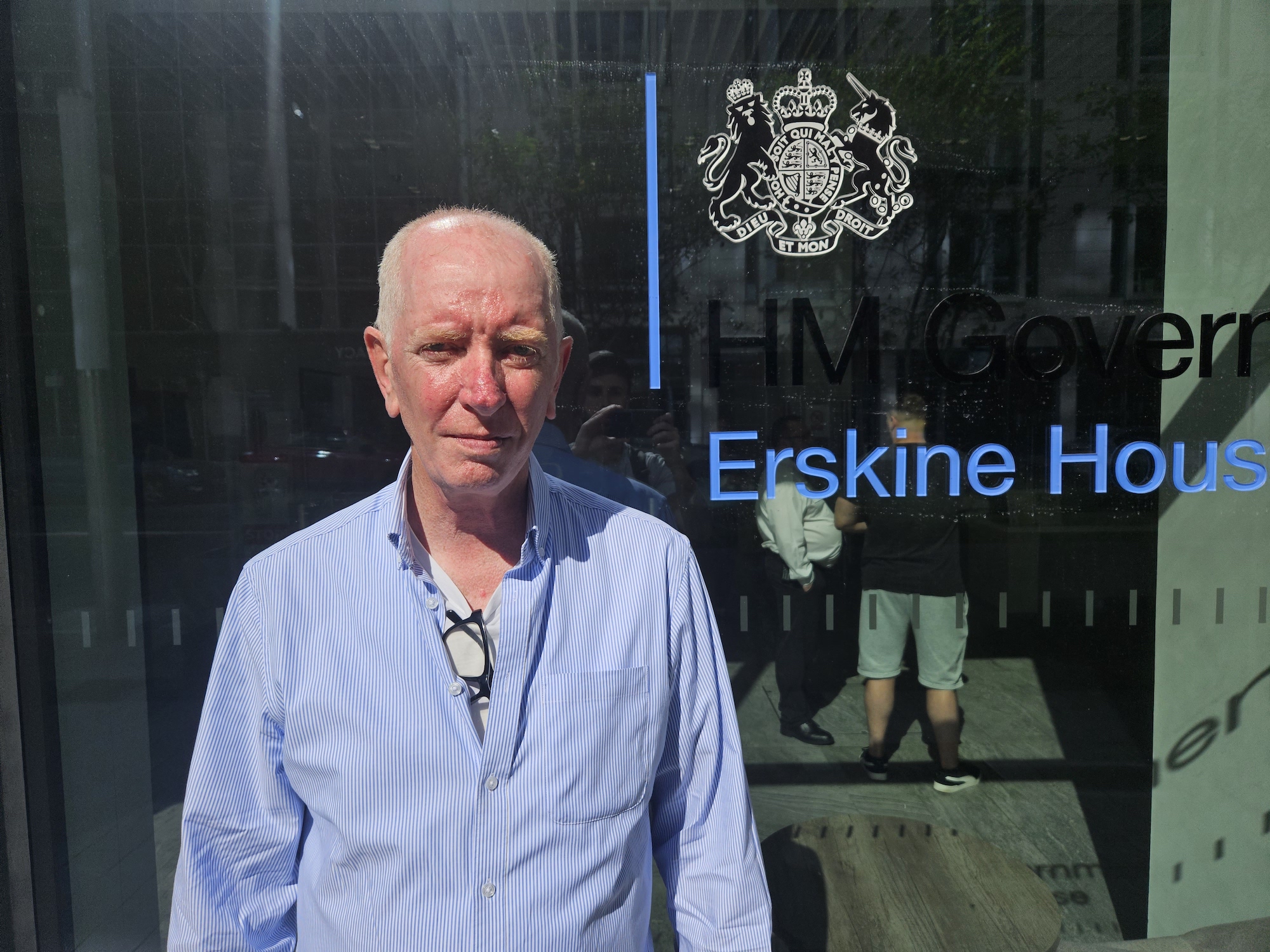
Belfast, Northern Ireland – Amid widespread opposition across the island of Ireland, the controversial Northern Ireland Troubles (Legacy and Reconciliation) Bill was passed by lawmakers in the United Kingdom’s House of Commons last week.
This week, it will return to the UK’s House of Lords, where it is not expected to face opposition, and is due to become law within weeks or even days.
The legislation will shut down new examinations of atrocities and other crimes committed during the Troubles, a prolonged civil conflict in Northern Ireland that pitted nationalists (mostly Catholic and in support of joining the Republic of Ireland) against unionists (mostly Protestant and hoping to remain part of the UK). The Troubles killed more than 3,600 people between the late 1960s and 1998.
Creating an effective cutoff date for ongoing inquiries and legal processes in little more than six months’ time, families face a race against the clock to ensure their long-running attempts for justice will be afforded due examination.
The legislation will also shut down examinations of past crimes in Britain.
Many inquest cases and criminal probes that currently sit with a branch of the Police Service of Northern Ireland (PSNI) are set to be transferred to the Independent Commission for Reconciliation and Information Recovery (ICRIR), a new body set up by the UK’s government as part of the incoming law.
It is not yet clear what the bill’s implications will be for ongoing investigations in the Republic of Ireland, or for Troubles-era cases that spilled over into other jurisdictions across Europe.
Al Jazeera spoke to several families and legal experts heading campaigns for justice and truth recovery against this backdrop.
Patrick Butler – Springhill massacre, 1972
Patrick Butler, 38, was shot by British armed forces in west Belfast on July 9, 1972. He was one of five – including three minors – who were killed that day by gunfire near the Springhill and Westrock estates, in acts that are thought to have been in retaliation against a breakdown in the Irish Republican Army (IRA) ceasefire at Lenadoon, west Belfast, during the same day.
Natasha Butler’s grandfather Patrick Butler, then 38, is understood to have died while tending to the wounded at the scene. He is thought to have been shot and potentially killed by the same bullet that killed Father Noel Fitzpatrick, 42, in the west Belfast residential area.

According to Butler, her family and others in the area were “brutalised” through violent morning raids for years following the killings. Her grandfather was labelled a “gunman” in military records.
An inquest was finally granted in 2014 into the killing of the five – a priest, a father of six and three minors – by the British Army on that day in what is now know as “the Springhill massacre”.
Three weeks of the inquest were heard in February this year. According to Butler, the families understand there is another eight weeks of evidence to go, at least, with no military witnesses having yet appeared and expert witnesses yet to give evidence in what is described by many as a complex inquest.
The remaining evidence submissions are yet to be scheduled.
If the inquest is not completed in its entirety by May 2024 (even if just one witness remains, Butler said), the inquest will time out under the new legislation.
She told Al Jazeera that families have “no confidence or trust” in the new state body for such cases, which her family’s inquest would be transferred to if not completed by May.
Butler is clear: she and her family are not seeking prosecutions. They simply want answers and to clear her grandfather’s name, more than 50 years after the killings.
Patrick Crawford – Royal Victoria Hospital grounds, Belfast, 1975
Patrick Crawford, 15, was shot dead as he walked through the grounds of the Royal Victoria Hospital in Belfast in August 1975, according to his surviving cousin Paul, 66, who spoke to Al Jazeera in Belfast last week.
Patrick’s mother Martha, he added, had been killed in crossfire at Andersonstown, west Belfast, just a few years earlier in March 1972.
Paul told Al Jazeera how the absence of a state-led truth recovery and justice process in Northern Ireland forced him to approach the loyalist paramilitary group (the Ulster Volunteer Force) that had killed his father as he left a factory he was working at in 1974.
Via an interlocutor, the loyalist boss Winston Irvine, Paul said he “got more answers than I ever have and believe I ever will from the state”.
The inquest into Patrick’s case is already under way, Crawford said, but has been delayed since the UK Ministry of Defence (MoD) is “dragging its heels” over the disclosure of documents.
His family were “not happy” with an initial 1979 inquest, Crawford also said.

A new inquest was secured through the sheer “determination” of Patrick’s sister, Magdaline, who met with the Attorney General over the case. This inquest began in 2015 and a considerable number of hearings have already taken place.
“The family are worried that the MoD will continue to delay and that the case will be closed in May,” Paul said.
Liam Shannon and Jim Auld, the Hooded Men, 1971
The Hooded Men case centres on torture allegations against the British Army during the period of internment introduced during the early years of the Troubles in the 1970s.
In 1971, 14 Catholic men, including Liam Shannon and Jim Auld, were allegedly tortured during interrogation by the British Army.
The men say they were subject to hooding, sleep and food deprivation, white noise and being left spread-eagled in stress positions – on top of having been repeatedly beaten by soldiers.
Six of the Hooded Men have died, underlining that “time is not on the side” of the remaining men and their families, in the words of human rights lawyer Kevin Winters.
Winters, who is representing Liam Shannon and Jim Auld, told Al Jazeera that the pair are due back in court this week.
To date, the Police Service of Northern Ireland (PSNI) has just carried out “preliminary scoping” exercises, according to Winters, which he said his clients argued “should have taken place a long time ago”. They want the PSNI to commit to a full criminal investigation of the torture and mistreatment they allege.
There is a long history behind efforts to seek justice in this case. In the 1970s, an interstate case was taken by the government of the Republic of Ireland against Britain at the European Court of Human Rights. About 18 months ago, the UK Supreme Court found that a decision by the PSNI to discontinue an investigation into the torture allegations was unlawful.
“Neither [Auld nor Shannon] are happy,” Winters said, with what they believe was a “contrived apology” issued by the PSNI this year, which they see as having been designed and timed to undermine the legal challenge before the court, following the Supreme Court’s 2021 ruling.
“In some ways, it’s too little too late,” said Winters. He told Al Jazeera the pair faced a “race against the clock now, for this investigation to gain traction”.
He added that their problems are “only compounded” by the legacy bill, which could see any investigation time out if significant progress is not made before May.
A legal challenge before the courts currently is designed to “bring these issues to head”, Winters said, in light of all this.
James Eames, double-murder case, 1972
James Eames, a member of the Ulster Defence Regiment (UDR) infantry, was carrying out checks of cars with Alfred Johnston on August 25, 1972 when a command-wire-initiated device is understood to have been detonated, killing both instantly.
John Downey, based in County Donegal, the Republic of Ireland, is charged with the double murder of the pair in Enniskillen (County Fermanagh, Northern Ireland) on that day, via the alleged car bomb attack. The vehicle exploded as a lorry carrying 13 off-duty soldiers approached, injuring a number of them.
There have been several delays to the criminal prosecution of Downey. Lawyers acting for Downey successfully claimed during the coronavirus pandemic that he was a “vulnerable individual” who had not at the time been able to access a COVID-19 vaccination. Downey was returned to his home in Donegal, where he had been extradited from and still faces charges.
Charlie Eames, James Eames’s nephew, is concerned the case could now be impacted by the new legacy bill.
“They just seem to be able to delay, delay, delay,” he said.
Eames cited the prosecution of “Soldier F” in the 1972 Bloody Sunday massacre as another case in which assurances have been provided, but relatives are concerned the bill may hinder or even block proceedings.
“We understand that existing cases will be allowed to progress,” Eames said. “But of course we have our doubts now.
“Technically, it shouldn’t impact the case. But we don’t know what to expect.”
Victims campaigner Kenny Donaldson, from the South East Fermanagh Foundation, believes Downey’s lawyers will try to use the new legislation to get the case thrown out now.
“This is why we oppose the bill,” Donaldson told Al Jazeera. “We believe terror groups should be made accountable and answer for what they are alleged to have done.”
Eoin Morley, notorious spy murder case, 1990
Eoin Morley was shot dead on April 15, 1990, allegedly murdered by a secret agent operating inside the Provisional Irish Republican Army at the time.
His murder took place on Easter Sunday in County Down. He was shot twice after masked men dragged him from his girlfriend’s house in the Derrybeg estate near the centre of Newry.
Morley’s mother, Eilish, has brought a criminal prosecution and sought damages against Peter Keeley (a former agent who has also gone under the pseudonym of Kevin Fulton) for alleged involvement in her son’s death.
Hers is the lead case in nearly 30 lawsuits being taken against the ex-British spy in connection with a series of paramilitary murders and attacks while he was working for a covert military intelligence unit.
According to Winters, who is also representing Morley, a legal challenge is being brought against the Police Ombudsman over the “failure to set aside the original Ombudsman’s findings in connection with the investigation into the killing of Eoin Morley”.
“We are saying to the Ombudsman that it needs to investigate that case again in light of new information and evidence,” he told Al Jazeera. “And the Ombudsman is currently reviewing its position on the legal challenge.”
He highlighted the additional pressure brought by the new legislation in attempts to get such cases heard, adding: “Yet again, the same difficulty that has emerged with the Hooded Men case has also emerged with this legal challenge.
“The challenge is twofold in these cases: getting the challenge over the line and giving legal effect to what is hopefully a successful court challenge. And this is all being done against the difficult background of doing this within a relatively short timespan.
“Britain’s role in the conflict through its state agencies, and abuse of informants and agents, is at the centre of a lot of this litigation. And the easiest way to get rid of this litigation is to push through this new bill and shut it all down.”







